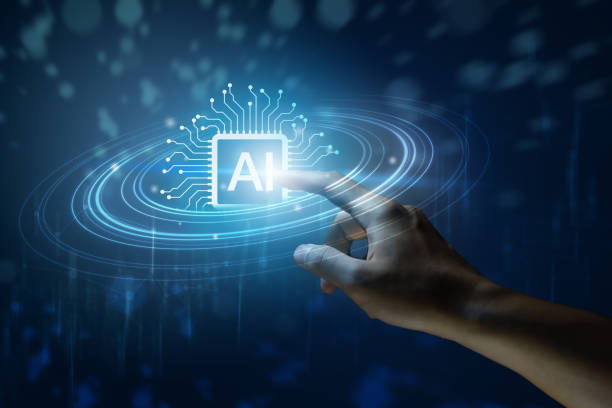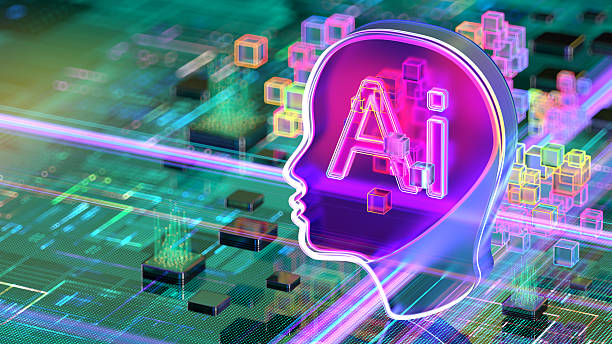What is Artificial Intelligence and why is it important?

#Artificial_Intelligence (AI) is a branch of computer science that focuses on building machines capable of performing tasks that typically require human intelligence.
This includes learning, reasoning, problem-solving, perception, and natural language.
The importance of AI lies in its ability to help us solve complex problems, automate tasks, and improve life.
From #Automotive and #Medicine to #Finance and #Education, AI is changing how various industries operate.
AI has been made possible with the help of machine learning and natural language processing.
These two fields allow machines to learn from data and communicate with humans in natural language.
Artificial intelligence is not only a powerful tool but also a fundamental challenge for the future of humanity.
There are questions about ethics, accountability, and the impact of AI on employment and the economy that need to be answered.
However, despite these challenges, the potential of AI to improve the world is immense.
AI has the ability to fundamentally transform our lives, and understanding and properly using it is essential for a better future.
As this technology continues to develop, it is expected that AI will play a more significant role in our daily lives and help solve global challenges.
Are you concerned about your e-commerce site’s low conversion rate and not achieving your desired sales?
Rasaweb is your specialized solution for having a successful e-commerce site.
✅ Significant increase in conversion rates and sales
✅ Professional and user-friendly design to attract customer satisfaction
⚡ Ready for a transformation in online sales? Get a free consultation!
Types of Artificial Intelligence: Different Approaches

Artificial intelligence can be categorized based on different capabilities and approaches.
One common categorization is the distinction between Narrow AI and General AI.
Narrow AI is designed to perform a specific task and performs well in that field.
Examples of Narrow AI include facial recognition systems, voice assistants like Siri and Alexa, and recommender systems.
General AI aims to build machines capable of performing any task a human can.
General AI is still in its early stages of development, and no real-world examples exist.
Furthermore, AI can be categorized based on various approaches.
Some common approaches include machine learning, knowledge-based reasoning, and neural networks.
Machine learning allows machines to learn from data without being explicitly programmed.
Knowledge-based reasoning uses predefined knowledge to solve problems.
Neural networks are inspired by the structure of the human brain and are used to solve complex problems such as image recognition and natural language.
The choice of AI type depends on the specific needs of each application.
For example, for a simple task like facial recognition, a Narrow AI system is sufficient.
However, for a complex task like autonomous driving, a more powerful AI system using deep learning is required.
Applications of Artificial Intelligence in Various Industries

Artificial intelligence currently has numerous applications in various industries.
In the #Medical field, AI can assist doctors in diagnosing diseases, developing drugs, and providing personalized care.
For example, AI algorithms can analyze medical images and detect early signs of cancer.
In the #Financial sector, AI can be used for fraud detection, risk management, and providing financial advisory services.
AI algorithms can identify unusual patterns in financial transactions and prevent fraud.
In the #Automotive industry, AI plays a key role in the development of self-driving cars.
Autonomous vehicles use AI to understand their surroundings, make decisions, and control the vehicle.
In the #Education sector, AI can help teachers provide personalized education and evaluate student performance.
AI systems can identify each student’s strengths and weaknesses and provide educational programs tailored to their needs.
AI also has numerous applications in #Marketing, #Manufacturing, #Transportation, and other industries.
As this technology continues to develop, it is expected that AI applications in various industries will become more widespread.
Overall, AI helps various industries become more efficient, accurate, and innovative.
This technology has the potential for fundamental transformation in how industries operate and can contribute to creating new jobs and improving the quality of life.
| Industry | AI Application |
|---|---|
| Medical | Disease diagnosis, drug development |
| Financial | Fraud detection, risk management |
Machine Learning: The Backbone of Artificial Intelligence

Machine Learning is a subset of artificial intelligence that allows machines to learn from data without being explicitly programmed.
In machine learning, algorithms use training data to identify patterns and relationships, creating models that can be used for predicting or making decisions about new data.
Machine learning is divided into two main categories: Supervised Learning and Unsupervised Learning.
In supervised learning, the algorithm is trained using training data that includes desired inputs and outputs.
The goal is for the algorithm to predict correct outputs for new inputs.
In unsupervised learning, the algorithm is trained using training data that only includes inputs.
The goal is for the algorithm to identify hidden patterns and structures in the data.
Machine learning has numerous applications in various fields such as image recognition, natural language processing, and recommender systems.
As this technology continues to develop, it is expected that machine learning will play a more significant role in solving complex problems and automating tasks.
The most important aspect of machine learning is the quality and volume of training data.
The more and higher quality the training data, the more accurate and reliable the machine learning models will be.
Machine learning empowers AI, allowing it to learn and improve through experience.
Don’t have a company website yet and are missing out on online opportunities? With professional company website design by Rasaweb,
✅ Double your business credibility
✅ Attract new customers
⚡ Free consultation for your company website!
Natural Language Processing: Machine-Human Communication

Natural Language Processing (NLP) is a branch of artificial intelligence that allows machines to understand and generate human language.
The goal of NLP is to create systems that can communicate with humans in natural language and perform tasks such as language translation, text summarization, and question answering.
NLP uses various techniques such as syntactic analysis, semantic analysis, and speech analysis to analyze human language.
Syntactic analysis deals with the grammatical structure of sentences, semantic analysis deals with the meaning of words and sentences, and speech analysis deals with the sounds of language.
Natural language processing has numerous applications in various fields such as machine translation, voice assistants, and question-answering systems.
As this technology continues to develop, it is expected that natural language processing will play a more significant role in human-machine communication.
For example, voice assistants like Siri and Alexa use natural language processing to understand users’ voice commands and answer their questions.
Machine translation systems use natural language processing to translate texts from one language to another.
Natural language processing enables Artificial Intelligence to communicate naturally with humans and perform tasks that were previously only possible for humans.
Neural Networks and Deep Learning

Neural Networks are computational models inspired by the structure of the human brain.
A neural network consists of many interconnected nodes (neurons) arranged in layers.
Each node receives an input signal, processes it, and produces an output signal.
Neural networks are used to solve complex problems such as image recognition, natural language processing, and time series prediction.
Deep Learning is a subset of machine learning that uses deep neural networks (networks with many layers).
Deep learning allows machines to learn complex patterns and features from data.
Deep learning has led to significant advancements in recent years in various fields such as image recognition, natural language processing, and autonomous driving.
Neural networks and deep learning empower AI to solve complex problems with high accuracy.
For example, deep neural networks can recognize images with high accuracy, even if the images are noisy or incomplete.
Deep neural networks can understand and generate human language with high accuracy, even if the language is informal or contains grammatical errors.
Deep neural networks can drive cars autonomously, even in bad weather conditions or heavy traffic.
The Future of Artificial Intelligence: Opportunities and Challenges

The future of artificial intelligence is full of opportunities and challenges.
On one hand, AI can help us solve complex problems, automate tasks, and improve life.
On the other hand, AI can create new issues such as job displacement, economic inequality, and ethical concerns.
To harness AI’s opportunities and mitigate its challenges, we must focus on the responsible and ethical development of this technology.
We must ensure that AI is used for the benefit of all members of society and prevents the creation of inequality and discrimination.
Additionally, we must focus on educating and training the workforce so that people can acquire the skills needed to work in the world of AI.
The future of AI depends on our decisions.
By developing this technology responsibly and ethically, we can utilize its potential to improve the world.
In summary, artificial intelligence is a powerful technology with the potential for fundamental transformation in our lives.
By understanding the opportunities and challenges of this technology, we can use it to create a better future for all.
| Opportunity | Challenge |
|---|---|
| Solving complex problems | Job displacement |
| Improving life | Ethical concerns |
Artificial Intelligence Tools and Platforms

Various tools and platforms exist for developing and implementing artificial intelligence systems.
Some of these tools and platforms include TensorFlow, PyTorch, Keras, and Scikit-learn.
TensorFlow is an open-source software library for machine learning developed by Google.
PyTorch is an open-source software library for machine learning developed by Facebook.
Keras is a high-level interface for machine learning that runs on TensorFlow and PyTorch.
Scikit-learn is an open-source software library for machine learning that includes various algorithms for classification, regression, and clustering.
These tools and platforms help developers easily create, train, and implement machine learning models.
Additionally, cloud platforms like AWS, Azure, and Google Cloud offer various AI services that help businesses easily leverage this technology.
Choosing the right tool and platform depends on the specific needs of each project.
Some tools are better suited for specific tasks like image recognition, while others are better for tasks like natural language processing.
By using these tools and platforms, greater speed and efficiency can be achieved in developing AI systems.
Losing potential customers due to an unprofessional website? Rasaweb is your answer! With our specialized corporate website design services:
✅ Enhance your business credibility and standing
✅ Experience attracting more targeted customers
⚡ Act now to receive a free consultation!
Ethical Issues in Artificial Intelligence

Artificial intelligence raises important ethical issues that must be addressed.
One such issue is Bias in training data.
If the training data used to train AI models is biased, the models will also be biased and make unfair decisions.
For example, if a facial recognition model is trained using data predominantly featuring images of white individuals, it may not perform well in recognizing individuals of color.
Another issue is the Transparency and Explainability of AI models.
Many AI models, especially deep learning models, are black boxes, and it can be difficult to understand how they arrived at a particular decision.
This can raise concerns about accountability and trust in these models.
Furthermore, issues related to Privacy and data Security are also important ethical considerations in AI.
It must be ensured that individuals’ personal data is securely protected and not used for unauthorized purposes.
To address these ethical issues, attention must be paid to developing appropriate ethical standards, laws, and regulations.
Additionally, education and training for individuals on AI’s ethical issues must be emphasized so that they can make informed decisions about using this technology.
Finally, collaboration among researchers, policymakers, and industry professionals must be fostered to find suitable solutions for these ethical issues.
AI is a powerful technology and must be used responsibly and ethically.
How to Learn Artificial Intelligence

Learning artificial intelligence is an ongoing process that requires effort and perseverance.
To start learning AI, you can use various resources such as online courses, books, and articles.
Online courses from platforms like Coursera, edX, and Udacity can be an excellent starting point for learning basic AI concepts.
Books can also be a great resource for deeper learning of AI concepts.
Research papers can also help you understand the latest advancements in the field.
In addition to studying, practical exercise is also very important.
You can undertake practical projects using AI tools and platforms like TensorFlow and PyTorch.
These projects help you apply theoretical concepts in practice and strengthen your skills.
Also, participating in online and in-person AI communities can help you learn from others and share your knowledge.
Artificial intelligence is a vast and diverse field.
With continuous learning and practical exercise, you can become an AI expert.
Also, for better learning, you can participate in online courses on this topic.
In summary, learning artificial intelligence requires a combination of study, practical exercise, and participation in specialized communities.
With effort and perseverance, you can acquire the necessary skills to succeed in this field and contribute to the advancement of the AI world.
Artificial intelligence is rapidly progressing, so continuous learning and staying up-to-date with the latest developments are essential.
Frequently Asked Questions
| Question | Answer |
|---|---|
| What is Artificial Intelligence? | It is the simulation of human intelligence in machines programmed to think like humans and mimic their actions. |
| What are the main branches of Artificial Intelligence? | They include Machine Learning, Deep Learning, Natural Language Processing, Computer Vision, and Robotics. |
| What is Machine Learning? | It is a branch of Artificial Intelligence that focuses on enabling systems to learn from data and identify patterns without explicit programming. |
| Mention examples of Artificial Intelligence applications in our daily lives. | Voice assistants (such as Siri and Alexa), recommendation systems in Netflix and Amazon, self-driving cars, and facial recognition programs. |
| What is Deep Learning? | It is a subset of Machine Learning that uses multi-layered (deep) artificial neural networks to process large amounts of data. |
| What is Natural Language Processing (NLP)? | It is a branch of Artificial Intelligence that focuses on enabling computers to understand, interpret, and generate human language. |
| What are some ethical concerns related to Artificial Intelligence? | They include data bias, privacy, job loss, and accountability in case of errors. |
| What are the main benefits of Artificial Intelligence? | Increased efficiency, improved decision-making, automation of repetitive tasks, and discovery of complex patterns in data. |
| How is Artificial Intelligence used in healthcare? | In disease diagnosis, drug discovery, medical image analysis, and personalized patient care. |
| How do you see the future of Artificial Intelligence? | It is expected to continue developing rapidly, affecting all aspects of human life, from industry to education and entertainment. |
And other services of Rasaweb Advertising Agency in the field of advertising
Smart Marketplace: Designed for businesses seeking to manage campaigns through the use of real data.
Smart Conversion Rate Optimization: A professional solution for customer acquisition focusing on precise audience targeting.
Smart Marketing Automation: A dedicated service for online growth based on custom programming.
Smart Sales Automation: An innovative service for increasing sales through marketing automation.
Smart Customer Journey Map: Professional optimization for customer behavior analysis using SEO-driven content strategy.
And over hundreds of other services in the field of internet advertising, advertising consultation, and organizational solutions
Internet Advertising | Advertising Strategy | Advertorials
References
Artificial Intelligence and the Future of Education
Education with Artificial Intelligence
Creating Educational Content with Artificial Intelligence
Investigating the Impact of Artificial Intelligence on the Future of Education and Content Creation
? Do you want to revolutionize your business in the digital world? Rasaweb Afarin Digital Marketing Agency, with its expertise in WordPress website design, SEO, and content marketing, is your comprehensive solution for online growth and prominence.
📍 Tehran, Mirdamad Street, next to Bank Markazi, Southern Kazeroun Alley, Ramin Alley, No. 6




